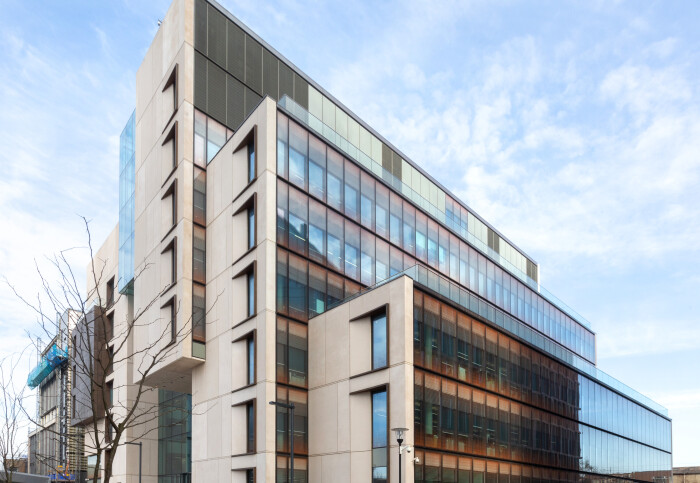Advancing Chemistry Research at Imperial with The Derek Wyles Equipment Fund

The Derek Wyles Equipment Fund at Imperial has made it possible to acquire vital equipment, leading to groundbreaking chemistry research.
The Derek Wyles Equipment Fund was established in 2021 through a generous donation to the Department of Chemistry by Derek Wyles, an alumnus and supporter of Imperial. The fund represents a donation of £1.3 million with the specific purpose of funding equipment needs across the department with an annual allocation. The goal of the fund is to facilitate new research initiatives and support ongoing research within the department.
The fund has already made a significant impact on the research being conducted at the Molecular Sciences Research Hub, with Professor Marina Kuimova and Dr Maxie Roessler successfully procuring new equipment for their respective research groups.
Professor Marina Kuimova
 Professor Kuimova’s group employs a range of imaging and spectroscopic methods to identify the mechanisms underlying cell function and death, including those occurring during Photodynamic Therapy (PDT) for cancer treatment. This encompasses rapid processes related to the excited states of biomolecules like DNA, and photophysics of coordination compounds.
Professor Kuimova’s group employs a range of imaging and spectroscopic methods to identify the mechanisms underlying cell function and death, including those occurring during Photodynamic Therapy (PDT) for cancer treatment. This encompasses rapid processes related to the excited states of biomolecules like DNA, and photophysics of coordination compounds.
The fund was used to procure an Interherence temperature control stage called VAHEAT to be attached to Professor Kuimova’s microscope. This stage allows for fast and precise temperature adjustment with heating rates of up to 100°C while maintaining the highest temperature precision.
Temperature control is crucial in many areas of research, especially in biology. However, standard heated stages often struggle to maintain the temperature when the sample touches the objective, which is held at room temperature and acts as a heat sink within enclosed and heated chambers. VAHEAT, on the other hand, uses a different technology where individual microscope slides are heated through a layer of conductive (yet transparent) material coating. Therefore, this technology guarantees the correct temperature at every point of the sample.
These are the things Professor Kuimova is hoping to improve with the setup:
- Live cell imaging - Ensuring a well-defined temperature when working with live cells to prevent influence on cellular processes.
- Studying lipid phase transitions - Steering, triggering and studying liquid-liquid phase separation in membranes.
- Diffusion processes - Diffusion coefficients have a strong temperature dependence.
- Nanophotonic structures - Temperature control of nanophotonic structures (such as gold nanoparticles) is useful for tuning their resonance frequency and changing shape.
Professor Kuimova commented: “I am absolutely delighted to have access to this equipment, which will improve so many aspects of our experiments and will hopefully make new studies and collaborations possible.”
Dr Maxie Roessler
 Dr Maxie Roessler’s research team specialise in using electron paramagnetic resonance (EPR) to analyse materials and molecules containing unpaired electrons, especially in enzymes.
Dr Maxie Roessler’s research team specialise in using electron paramagnetic resonance (EPR) to analyse materials and molecules containing unpaired electrons, especially in enzymes.
Dr Roessler was able to purchase a rotor for her group's ultracentrifuge that can handle much smaller sample quantities and higher centrifugation speeds than our existing rotor. This included a Beckman Type 90 Ti Fixed-Angle Rotor that holds 4 mL samples (instead of 70 mL) and allows centrifugation speeds up to 90,000 (rather than just 45,000).
Dr Roessler's lab has successfully implemented the "small-volume high-speed" rotor, revolutionising the purification of membrane proteins they work with. The rotor has significantly enhanced the efficiency and quality of their work, leading to implications for early career researchers in the group. With this new equipment, they are now capable of obtaining precise EPR (electron paramagnetic resonance) measurements of proteins embedded in artificial membrane systems. This advancement allows for a deeper understanding of the proteins' mechanisms in a native yet controlled environment. Additionally, beyond Dr Roessler's group, the rotor has opened up new possibilities for other users. For example, they have already supported a research project from the medical school.
Dr Roessler commented: “I was absolutely thrilled! It is very difficult to secure money for 'intermediate' pieces of equipment like this and the Derek Wyles Equipment Fund was an ideal opportunity for us to make a case for what was fast becoming a bottleneck to progress research in my group - and beyond. Other users of the ultracentrifuge were also delighted to receive the news of the successful bid.”
New and upgraded equipment means more cutting-edge research being done, helping to propel Imperial as a future-forward university and make advancements in the world of chemistry.
“Providing cutting-edge instrumentation is critical to enabling our students and staff to observe, monitor and control chemical processes across a variety of length scales. Thanks to Mr Wyles’ wonderful donation, we have been able to acquire new technologies currently not available in the Department and upgrade the capabilities of existing systems, unlocking new future discoveries.” Oscar Ces, Head of Department.
Article text (excluding photos or graphics) © Imperial College London.
Photos and graphics subject to third party copyright used with permission or © Imperial College London.
Reporter
Saida Mahamed
Department of Chemistry